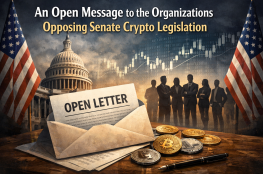This is a guest post by Will Schweitzer. Will is a lifelong New Yorker and has been working at the intersection of emerging tech, national security, and politics since 2008.
“Behind the ostensible government sits enthroned an invisible government owing no allegiance and acknowledging no responsibility to the people. To destroy this invisible government, to dissolve the unholy alliance between corrupt business and corrupt politics is the first task of the statesmanship of the day.”
– Theodore Roosevelt, 1910
In American history, the drive for decentralization has often been at the heart of progressive reform. From Theodore Roosevelt’s trust-busting campaign to the broader progressive vision for a fairer, more transparent society, the ideal of spreading power and opportunity to local and individual levels has guided major shifts in American governance. Yet today, a key area where centralization persists, and even grows, is the political financial system. The wealthiest individuals dominate political spending, and this spending skews legislation and policymaking in their favor—often at the expense of the broader public interest.
Progressives have long decried the disproportionate influence of money in politics. However, there is a new and potentially revolutionary solution: Bitcoin. As an open, decentralized monetary system, Bitcoin offers a unique opportunity to realign our political system with the principles of decentralization that have been foundational to American democracy. Through Bitcoin, we can begin to decentralize campaign finance—a shift that could fundamentally alter the way elections are funded, won, and our nation is governed.
The concept of decentralization has deep roots in American political philosophy. From the framers of the Constitution, who designed a system with a balance of power between local, state, and federal governments, to the three branches of government—executive, legislative, and judicial—the U.S. political system is built around the idea that power should not be concentrated in one entity or group.
In many ways, this decentralization has worked, allowing for local control and regional diversity within the broader fabric of the nation. However, when it comes to money in politics, our system has veered from this ideal. Large financial interests—those with the resources to fund massive campaigns—have steadily gained outsized influence over the political process. The Citizens United ruling (2010) further cemented this imbalance, allowing unlimited campaign donations from corporations and wealthy individuals.
The result? Wealthy donors essentially hold veto power over much of the political discourse, ensuring that legislation and policy disproportionately favor their interests. Progressives, who have long fought for the rights of the marginalized and working-class citizens, find themselves in a constant struggle to counterbalance the financial influence of the elite.
But what if we could shift the entire foundation of political financing?
Enter Bitcoin—the decentralized digital currency that embodies the very principles of distributed control and individual empowerment. Created to be independent of central authority, Bitcoin enables peer-to-peer transactions, free from the oversight of banks or governments. In a way, Bitcoin is the natural ally to the progressive vision of decentralization.
For progressives, Bitcoin offers a chance to fundamentally rethink how our political campaigns are funded. Instead of relying on the wealthy few, Bitcoin could provide a bottom-up funding model that empowers ordinary citizens, small donors, and local communities to take back control of the political process.
One potential avenue for Bitcoin to support progressive political reform is through strategic Bitcoin reserves at the state and local levels. Recent enthusiasm around state governments purchasing Bitcoin as a reserve asset (similar to how countries hold gold reserves) highlights an exciting opportunity. These Bitcoin reserves can grow in value, providing a non-inflationary, globally recognized asset that can be used for public purposes, such as funding political campaigns.
Just as Theodore Roosevelt broke up monopolies to ensure that no single entity could dominate a market, Bitcoin provides a way to break the monopolistic grip of money in politics. States and local governments, by investing in Bitcoin, could generate substantial returns over time, returns which could then be allocated to public financing of political campaigns—effectively allowing citizens to fund elections with money that isn’t beholden to traditional financial systems or elite interests.
This shift would directly challenge the big-money influence in politics that has, for so long, worked to skew policies in favor of the wealthy. It would take power away from corporate donors and billionaire financiers and put it back in the hands of ordinary voters.
The progressive ideals of Theodore Roosevelt—particularly his trust-busting efforts—offer a rich historical parallel to this new effort to decentralize political finance. Roosevelt’s famous campaign against monopolies sought to restore power to the people, breaking up concentrated wealth and power to ensure a more just society. He believed that unchecked power in the hands of a few could lead to corruption and a system that no longer served the public interest.
By embracing Bitcoin, progressives today can expand Roosevelt’s legacy—fighting corruption not just by regulating corporations, but by restructuring the entire financial system that funds our politics. Bitcoin, with its decentralization, offers an effective means to level the playing field and combat the financial oligarchies that currently dominate political discourse.
Bitcoin presents a clear opportunity for progressives to rethink campaign finance. With its decentralized nature and potential for appreciation, Bitcoin can serve as a vehicle for political funding that removes the undue influence of the wealthy and restores democracy to its rightful owners—the people. As states and local governments begin to accumulate Bitcoin, we can imagine a world where political campaigns are financed by citizens, not corporations or billionaires.
By supporting public financing with Bitcoin-backed reserves, progressives could create a political environment where campaigns are funded by small-dollar donations from voters, not by the super-wealthy. This bottom-up financing could bring about the type of political reform that Theodore Roosevelt would likely champion—one where power is more evenly distributed, and government responds to the people, not the elites.
The time has come for progressives to embrace a tool that can help decentralize not just our monetary system, but also our political system. Bitcoin offers a new path forward—a way to remove the financial centralization that currently dominates our elections and put the power back into the hands of ordinary citizens.
Much like Roosevelt’s efforts to break up monopolies and promote economic fairness, progressives today can use Bitcoin to fight corruption, ensure equal representation, and give ordinary Americans the ability to participate in the democratic process on a level playing field. Decentralize our politics—starting with the funding, and the future of democracy will be stronger, fairer, and more equitable.

Will Schweitzer is the Founder and Managing Director of Schweitzer LLC, where he helps progressives and Democrats build strategic relationships with Bitcoiners and crypto advocates.




